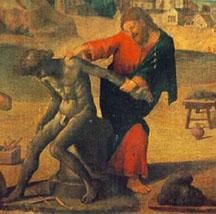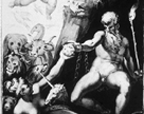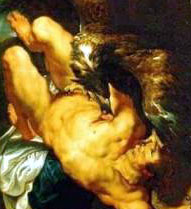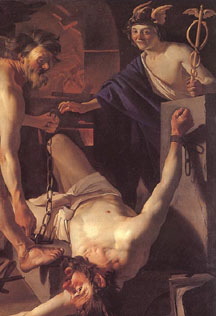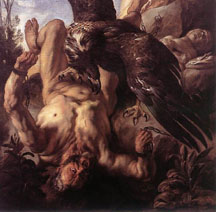|
The Corpus Classical Greece and Rome The Greek playwright Aeschylus wrote his stunning Prometheus Bound circa 467 BCE. As shown by the title, Aeschylus chose the torment theme to explore. Creation and fire-theft are relegated to backstory. It is the agony on the rock, and what it represents--the victory of ignorance over enlightenment, of brutality over generosity--that draws him. It is chilling to hear the bitterness of Prometheus's rage against the world in general and Zeus in particular. Aeschylus is responsible for fleshing out the story--or at least for writing down a lot more detail from contemporary oral versions than did Hesiod. Fire becomes a full-blown metaphor for knowledge, science, language, indeed all things that separate humankind from the animals. The fire-theft is the gift of a just and compassionate god who risks his own existence to raise humankind from ignorance and want:
Few students of comparative literature would disagree that the Prometheus Legend reached the apex of its power with Aeschylus. Not that has slowed anyone down. Back in the olden days, it was anticipated and accepted that a poet or artist would have a go at the classics. "Originality" in storytelling is a modern concept--one might say, "delusion" after even this brief check of the record, which shows that the literary archetype is antithetical to originality, indeed appears to have no certain origin at all. Thus, hot on Aeschylus's heels we find such worthies as Herodotus (c. 440 BCE) and Plato (c. 360 BCE) recording Prometheus' exploits. Aristophanes (the Woody Allen of his day) lampoons Prometheus in his comedy, The Birds (414 BCE). In the early days of the Christian Era, Pausanius, Apollodorus, Ovid and who knows who all else took their turn. And that's only the writers. The earliest surviving artwork is the Corinthian vase, made about 550 BCE. Its presentation of the artist's chosen theme is as stark as the words of Aeschylus. This sets a precedent: as we trace the Legend down through the centuries, Promethean art and literature follow parallel paths, inevitably reflecting, as noted above, the attitudes and perceptions of their times. The selected images in this essay represent the preoccupations of the storytellers of their time.
Renaissance Thanks to the ensuing Dark and Middle Ages, the record is blank until the 16th c., when Prometheus reemerges as a favorite subject of the art world (which had recently rediscovered the classic--not for the last time). Times have changed. The starkness and lack of sentimentality of the classical era has been replaced by the drama and passion of the Renaissance. But the themes are the themes, though for a while, the painters have sole possession of them.
Creation. The Myth of Prometheus, Piero di Cosimo, 1515.
Fire-theft. Morandi, 1570
Torment. Chained Prometheus, Peter Paul Rubens, 1611/12 (detail). Rubens made the upside down Prometheus all the rage for a while.
Torment. Prometheus Being Chained by Vulcan, Dirck van Baburen , 1623 (cropped).
Torment. Prometheus Bound, Jacob Jordaens (top: Hermes; bottom: Prometheus), 1640.
In 1773, the literary thread reappeared when Goethe wrote "A Poetic Monologue: Prometheus." It never disappears again. |
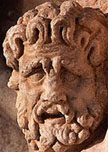 Glorious to witness the venomous Hermes as he bears messages from Zeus, alternately taunting Prometheus and tempting him to give in. And all the while the Chorus, the voice of the masses, whispers of the wisdom of bowing down to might even when might is most definitely wrong (Ah, they are wise / Who do obeisance, prostrate in the dust, / To the implacable, eternal Will).
Glorious to witness the venomous Hermes as he bears messages from Zeus, alternately taunting Prometheus and tempting him to give in. And all the while the Chorus, the voice of the masses, whispers of the wisdom of bowing down to might even when might is most definitely wrong (Ah, they are wise / Who do obeisance, prostrate in the dust, / To the implacable, eternal Will).